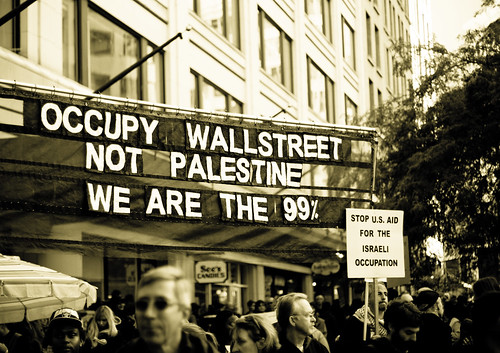
On September 17th, Occupy Wall Street will celebrate one year of protests in a National Day of Action, dubbed #S17. That this date also happens to coincide with Rosh Hashanah is symbolic of the relationship Occupy has had with American and Israeli Jews since the first days of the movement.
The Jews of Occupy Wall Street and side group Occupy Judaism were extremely energetic and involved during the Zuccotti Park era, when Jewish protestors celebrated the Occupy version of the High Holidays in the open space. Although Occupy Judaism has waned since the evictions, organizers are hoping to see a resurgence in activity with the one-year anniversary.
Occupy Wall Street’s ties with Judaism stretch back to many New York City organizers, but of particular interest is Kobi Skolnick. One of the original 20 organizers of the Occupy Wall Street movement, Mr. Skolnick was previously a settler in the occupied territories and a Chabadnik (an observer of a branch of Orthodox Judaism) turned non-observant Israeli who participated in the protests against the Oslo Accords. But upon seeing the suffering of Palestinians, he changed his opinions to become a self-described “man of peace.”
Mr. Skolnick’s focus in joining the Occupy Wall Street protests are representative of the larger Jewish interest in the movement: while economic and social inequality are at the forefront of their concerns, they are also concerned about the social and political position of Palestinians in the occupied territories, the increasingly aggressive nature of the Israeli government, and the foreign policy partnership between the United States and Israel.
The partnership between the United States and Israel is ideologically based on what American pundits call a “special relationship” going back to the Judeo-Christian roots of the United States, but is also based on the importance of Israel as an established nation in Evangelical Christianity in bringing about the end-times. This relationship, as a result, is based on a largely one-way transfer of money and military technology from the United States to Israel for its defense.
Debates about whether this is good policy, surprisingly, do not rage through American politics; all too often, those who speak out against the policy—even though reasoned, rational arguments—are vilified as being anti-Semitic. Such a label was quickly applied to Occupy protestors, who stepped out of the bounds of normal American discourse by calling for and end to exorbitant U.S. financial support of Israel while lower-class Americans were facing cuts to social benefits and until the money would not go to violating the human rights of Palestinian civilians. However, because of the extreme sensitivity of this issue in the U.S., Occupy so far seems to have been unsuccessful in changing the dialogue substantially, despite the growing number of left-leaning American Jews who are more willing to criticize the Israeli government for its actions.
Similarly, Occupy protests in Israel have also focused on social justice issues their own country faces, including a lack of access to public housing and a collapsing social welfare net. While the protests over these issues organized by Occupiers themselves have died down, their message has lived on, and even received renewed attention after four elderly Israelis set themselves on fire in less than one month’s time over the hopelessness of their individual situations. Most recently, protestors have taken to the streets in solidarity with struggling newspaper Maariv’s employees, most of whom are slated to be laid off at the end of the month without their pensions or severance pay.
In the midst of all this, Occupy has been criticized for claiming to sympathize with the plight of Palestinians, who have also been protesting over poor economic conditions, but failing to bring attention to the topic in the same way they have for their own social justice complaints. Elana Schwartz of The New Inquiry in particular called out the protests for calling for an “apartheid sociality” in which calling for help for struggling middle class Jews is a worthy “social protest,” while engaging Palestinians suffering from many or more of the same economic grievances is a more undesirable “political protest.” At least for the moment, Occupy Israel has become almost an entirely Jewish conversation, dealing with what seems to be more practical social justice issues rather than entrenched ideological issues, but in the process, leaving the very people needed for substantial reform of the system out of the conversation.
Occupy groups in both the United States and Israel have proven to be effective forces in changing the dialogue on entrenched economic and social issues in the past year. At their one-year anniversary, perhaps they have an opportunity to change international dialogues by focusing on Israeli-Palestinian reconciliation.
Chrisella Sagers Herzog is the deputy editor for the Diplomatic Courier.
For further information on the topic, please view the following publications from our partners:
Jerusalem, Netanyahu and the Two-State Solution
The Emperor Has No Clothes: Palestinians and the End of the Peace Process
The future of Israel-Palestine: A One-State Reality in the Making
For more information on issues and events that shape our world please visit the ISN’s Security Watch and Editorial Plan.

